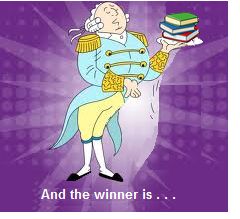 A literary spat that broke out some 30 years ago tickled my funny bone after reading about it in today's New York Times Book Review section. But the article also got me to thinking about what we in book clubs read.
A literary spat that broke out some 30 years ago tickled my funny bone after reading about it in today's New York Times Book Review section. But the article also got me to thinking about what we in book clubs read.
Thirty years ago, authors and publishers split ranks over the National Book Awards—differing on what kind of books should win.
On one side stood the panel of authors and critics who selected the winners. They championed books of high literary merit, based on prose and philosophical insight. Unfortunately, those books don't tend to be big sellers.
On the other side stood publishers who accused the panel of being elite insiders. Why not select big sellers, books that actually make money...just in case anyone forgot that publishing's a business?
I'm not taking sides here, but it got me to thinking about the books we select in our book clubs. I've taken issue on a number of occasions with those who think book clubs read drivel or those who refer to us as a gaggle of geese.
While I don't think most of us tackle a steady diet of difficult "literary" works, and while occasionally we do chose lighter fare, book clubs primarily look for works that engage the reader—compelling characters, solid plotting, and some darn good writing. We also like works that take on issues that divide humanity and do harm to body and soul.
We also want books to be accessible. Finally, they should lead to lively discussions—because conversations about literature can open eyes and change minds. Actually, when you think about it, all those requirements make a pretty tall order for any author.
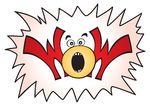 It's easy (for me, at least) to talk about books and writers that disappoint, so maybe it's time to talk about the ones that knock your socks off, the writers that astonish you with their prose. Not just good writing, or even really good writing, but extraordinary writing.
It's easy (for me, at least) to talk about books and writers that disappoint, so maybe it's time to talk about the ones that knock your socks off, the writers that astonish you with their prose. Not just good writing, or even really good writing, but extraordinary writing.
The books I've listed below aren't necessarily my favorites, though some are; they're not always heavy on plot, and a number are interrelated short stories—not my particular structure of choice.
Mainly, they're impressive for the sheer beauty of their prose and vision—the kind of writing that elicits a shiver and a..."how did they do that?" Some are fairly new releases, others have been around for a couple of years. Here's my list...so far.
| Kevin Brockmeier | — | The Illumination |
| Jennifer Egan | — | A Visit from the Goon Squad * |
| Louise Erdrich | — | A Plague of Doves |
| Jeffrey Eugenides | — | Middlesex |
| Jonathan Franzen | — | Freedom * |
| Nicole Krauss | — | Great House |
| David Mitchell | — | A Thousand Autumns of Jacob de Zoet * and Cloud Atlas |
| Elizabeth Strout | — | Olive Kitteridge * |
| Zadie Smith | — | On Beauty * |
| (* Click on title for Reading Guide; click on * for our Book Review.) | ||
Of course, there are plenty of wonderful writers...really, really good ones. Some of my favorites are Kate Atkinson, Margaret Atwood (she probably should be on the superlative list), Anita Brookner, Michael Chabon, Jonathan Safran Foer, Elinor Lipman, China Mieville, Ann Patchett, Richard Russo, and Colm Toibin.
Let us know if you've got some superlatives...or some all-time favorites.
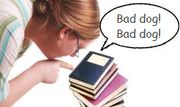 Some books make you wonder why the author bothered...and then make you wonder why YOU'RE bothering. Do you continue with a disappointing book...or put it down?
Some books make you wonder why the author bothered...and then make you wonder why YOU'RE bothering. Do you continue with a disappointing book...or put it down?
I've done both recently. I picked up Jaimy Gordon's Lord of Misrule on the basis of its solid reviews. But Gordon's prose felt so clogged and overworked it was offputting. It turns out Gordon is a professor of writing, which maybe is why the book feels a bit like a writing-class exercise. I love dense, rich prose, but not.... Well, anyway, I put the book aside.
Then I picked up Sara Gruen's newest, Ape House, in which a family of apes—who communicate using American Sign Language—eventually become stars in their own reality tv show. Just think of the possibilities! But Gruen's prose is thin and screen-writerish. And her apes turn out to be a lot more interesting than her humanoids.
I finished Gruen's book, though—thinking there might be a payoff. Besides it wasn't painful to read. And there is a sort of pay-off at the end, predictable but sweet.
*Added later...For a truly great read about apes and people, try The Evolution of Bruno Littlemore (sorry, no reading guide)...it's brilliant, funny, and disturbing.
Questions for Book Clubs
What do you do with disappointing books...especially if one is your book club selection? Which ones have disappointed...and why?
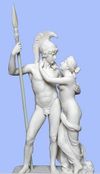
Lately, I've been struck by something strange: my growing preference for male writers. I'm a little tired of Venus, which is hard for me to admit...what with being a girl.
But after reading a lot of female authors recently, I find myself bored with their focus on the intimate—the bird's eye view into relationships and family—waiting for the shoe to drop, the relationships to explode, tragedy to strike, and a general mess to be made of everything. I'm always worried how it all gets cleaned up.
I'm thinking of authors like Sue Miller, Jodi Picoult, Anne Tyler, Alice Hoffman, Jennifer Weiner, Marilynne Robinson. These are incredibly talented writers; they're wonderful. It's just that....
Men seem to write on a larger scale; even the personal is painted on a broader canvas, sometimes of near-epic proportions. I'm thinking of David Mitchell's The Thousand Autumns of Jacob de Zoet ... Jeffrey Eugenidies Middlesex...David Wroblewski's Edgar Sawtelle......Phlip Roth's The Human Stain or American Pastoral.
After finishing one of those novels, I feel as if I've been part of something grand, something vast and far beyond my day-to-day perception of life. There's a thrill in that.
But now, in the very act of putting pen to paper (or finger to key), I'm starting think of all the exceptions: Hilary Mantel's Wolf Hall is of an era, and Louise Erdrich's Plague of Doves is mythic. Both Richard Russo and Chris Bohjalian write with penetrating intimacy. So...well, there you go. I've proven nothing.
Still, the issue recalls an earlier post in which I asked the same question: Do men and women write differently? The question at the time was spurred by Liesl Schillinger, who wrote in a New York Times review of Domestic Disturbances:
While the voice and mood of the novel are masculine, clinical and objective . . . the book’s descriptions of colors, smells, clothing and bodies show feminine perception.
So...if Liesl can say something like that...maybe I'm not nuts.
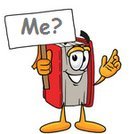 Ever get that “ah-ha!” feeling when reading? You come across a passage that practically shouts, “Hey, pal. Pay attention—this is YOU we're talkin' about.” It’s eerie, sometimes unnerving.
Ever get that “ah-ha!” feeling when reading? You come across a passage that practically shouts, “Hey, pal. Pay attention—this is YOU we're talkin' about.” It’s eerie, sometimes unnerving.
One of the narrators of Nicole Krauss’s Great House describes herself in a lengthy passage…and I felt an itch of recognition, a not very pleasant itch either…so I won’t quote it here.
But I love that books can do that…make us see ourselves…recall feelings and experiences…and put them into words! It’s uncanny.
Question for Book Clubs
Was there a particular character—or moment—in the book you’re reading now that gave you a sense of self-recognition? What about in other books? If you’ve come across those passages, can you recall how they made you feel?
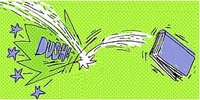 Years ago a friend came across a sex scene in Nelson DeMille’s Gold Coast—a couple playing a masquerade to juice up their sexlife. It was so offensive to her she tossed the book across the room—all of which she proudly announced to our book club. (The offending passage involves Lady Godiva...on a horse, of course...very funny. There's an even funnier pirate scene later on.)
Years ago a friend came across a sex scene in Nelson DeMille’s Gold Coast—a couple playing a masquerade to juice up their sexlife. It was so offensive to her she tossed the book across the room—all of which she proudly announced to our book club. (The offending passage involves Lady Godiva...on a horse, of course...very funny. There's an even funnier pirate scene later on.)
What about you? Ever throw a book? I nearly did the other night. In my case, it had to do with the book’s heroine—dense, bratty (her own words turned on herself), and stubborn, in a very stupid way. It was all the more irritating because the book had started out with such promise.
What makes a book toss-worthy? What gets us so riled up that we want to throw it across the room? Is it anger … revulsion … disappointment … fear? And what sparks those emotions?
What's a toss-worthy reason?
• graphic sex or violence?
• offensive language?
• gross injustice?
• irritating characters?
• predictable plot lines?
• unrealistic coincidence?
• just plain bad writing?
But here's the thing...isn't it wonderful how literature evokes such passion? Think about it—books come to us as nothing more than tiny black squiggles on a flat white page…which we use to create meaning…which in turn inspires powerful responses. Astonishing…when you think about it.
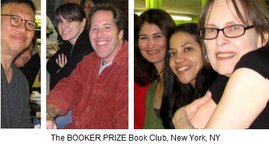 Check out LitLovers newest Featured LitClub—a brainy group of New Yorkers, who tackle the Booker Prize awards list (winners and nominees). That’s some impressive reading!
Check out LitLovers newest Featured LitClub—a brainy group of New Yorkers, who tackle the Booker Prize awards list (winners and nominees). That’s some impressive reading!
They also have a great idea for any book club—a Book Swap. The group organized a Swap at a library in SoHo (SoHo…ah, how cool izat?) in conjunction with a Peace Corp veterans book club. It proved so successful the library wants to make it a seasonal event.
The two groups are also considering a joint read and discussion. The Peace Corp group reads international books, which ties in beautifully with the Booker Prize list. *
* Britain’s Man Booker Prize is awarded to English-written novels by authors from the 54-member [British] Commonwealth of Nations, plus Ireland and Zimbabwe. Commonwealth nations include countries in Africa, the South Pacific, and the Carribbean, as well as Australia, Canada, India, New Zealand.
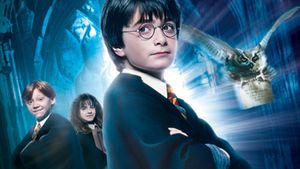 It’s late in the game, I know. But I just finished reading ALL 7 HARRY POTTER BOOKS. I’d avoided them up to now because…
It’s late in the game, I know. But I just finished reading ALL 7 HARRY POTTER BOOKS. I’d avoided them up to now because…
1. They’re for KIDS
2. I don't like FANTASY
3. Way too much HYPE
4. I’m swamped with a long list of "MUST-READS."
Turns out, I was misguided—on all 4 counts. Apologies to the millions of HP fans—I’m now one of you. ICH BIN EIN HARRY POTTER-ER!!!!
Some thoughts on Harry Potter books
- They're complex—seven long novels with interlocking plots, details, secrets and characters. How did Rowling keep track of it all? Post-it notes… index cards… spread sheets… interlocking charts?
- They're funny—portraits on the walls that talk and leave their home frames to visit to their neighboring portraits. There are schoolbooks with titles like "Which Broom" and "One Minute Feasts—It’s a Miracle!" and much, much more.
- They're mythological—represent the archetypal hero's journey; peppered with parallels to Greek, Druid, and Norse mythology.
- They've got rich, long sentences—some real doozies, stretching out to 50 words! FIFTY! They’re lovely things, encouraging kids (and adults) to appreciate complex thoughts along with what it takes to express those thoughts.
Granted, the writing on occasion is clunky, the storyline over-plotted, and villains cartoonish—but all of that’s incidental considering the totality of Rowling’s project. I’m enthralled… and surprised that I am! If you haven’t read Harry Potter… do!
For book clubs, we have Reading Guides for all seven… with discussion questions.
 In my last post, I raised the issue of whether video games might someday inspire book-club-like-groups. Here’s a follow-up…
In my last post, I raised the issue of whether video games might someday inspire book-club-like-groups. Here’s a follow-up…
Jeff, my nephew showed up at our house (after I’d written the first post) with “Rain,” an adult mystery video game. As I watched him play, I found myself caught up in the story—unable to pull my eyes away from the screen, let alone leave the room to fix dinner.
The graphics were good, the storyline engaging, and the interactive nature allowed Jeff to make decisions on the part of his characters. And different decisions led to different outcomes.
What was surprising was how invested I was in the characters—yet I wasn’t the one holding the joystick! Jeff was the one holding the joystick—and he clearly cared about his people. After all, they could act only through him.
It's a bit like writing and reading a novel at the same time. Playing these games, you're both author and reader of the same work. How cool is that?
Prediction? I bet 10-15 years from now people will be meeting to talk about video games—just as we do about books. Given time, the plots and characters will grow more sophisticated and complex—with rich possibilties for discussion. We’ll talk about why we made the choices we did, why we developed the characters we did … and how outcomes varied from member to member.
Exciting but worrisome. One wonders about the future of BOOKS—stats on the number of folks who read them is increasingly dire. So one asks (well, I do) as wonderful as technology is, is it leading us backwards?
 Tim Bissel is a grown man—a writer and professor of writing—who's obsessed with videogames. In fact, he considers them a budding art form.
Tim Bissel is a grown man—a writer and professor of writing—who's obsessed with videogames. In fact, he considers them a budding art form.
In his new book, Extra Lives: Why Video Games Matter, Bissel says the games are “as gripping as any fiction" he's come across”—and, get this—that Grand Theft Auto IV is ”the most colossal creative achievement of the last 25 years.” That's quite a claim.
What excites Bissel, really excites him, is the interactive nature of games, the idea of...
turning narrative into an active experience,
something which film [and literature] is
unable to do in the same way.
So it got me to thinking about the history of the novel and film, both of which were once were considered upstarts—having to prove their artistic worth to skeptics. Right now, Bissel isn’t impressed with the “literary” skills of the video game designers. But given time, won’t those skills—dialog and characterization—develop just as they did in fiction and film?
And consider this—literary fiction is the only art form that allows us to slip the boundaries of our own skin and enter another’s. When we identify with literary characters, we think and feel as they do…we BECOME those characters for the duration of the book. But we’re still passive participants, only along for the ride.
Now think what it might be like, say 10-15 years from now, to enter into a book or film’s action … to particpate actively … to affect its outcome. How will that work? I don’t know, but … I’m getting out my daughter’s old joypad to practice!
Questions for Book Clubs
Have fun—consider what a book club might be like 20 years from now. Will we all come with our little laptop video games? Will we discuss what actions each took…and how we changed the direction of the plot?
See Part 2 of this post.
